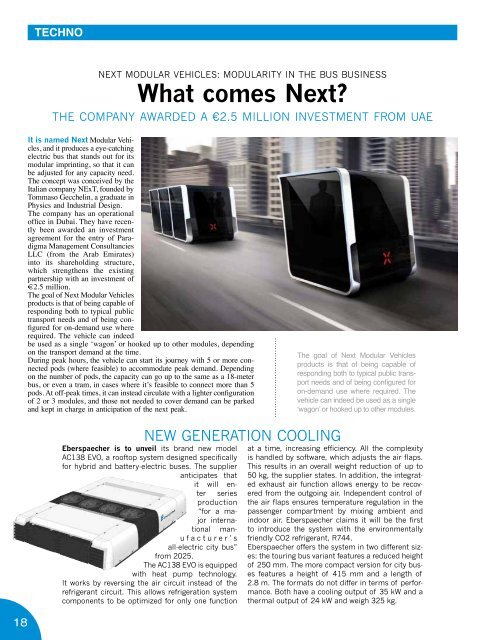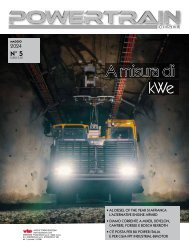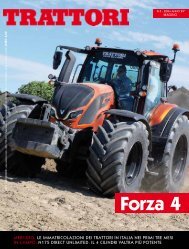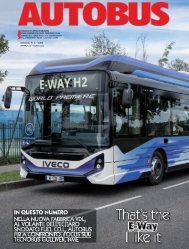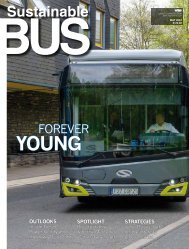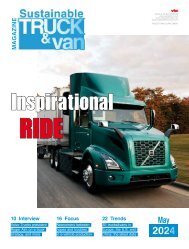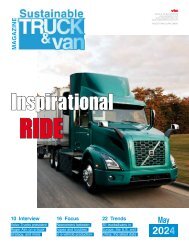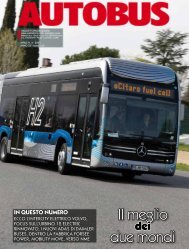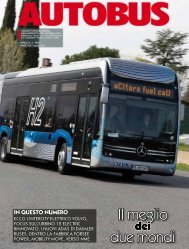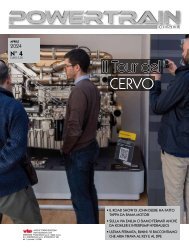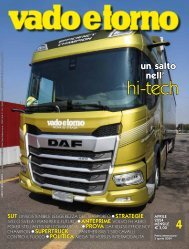2023-09 SUSTAINABLE BUS
A new issue of Sustainable Bus is out today. In this upcoming edition, we’ve curated a diverse and comprehensive range of topics that spotlight the latest developments in the world of sustainable mobility. From cutting-edge technological advancements to market insights and industry transformations, this issue promises to be a captivating exploration of the future of public transportation. What you could fine inside? Well, a market insight will offer you a detailed look at the European e-bus market, providing you with a comprehensive understanding of the mid-2023 results. The leading e-bus market in Europe is still UK: therefore, we focused our attention on that specific market with a report that sums up strategies, focus, goals of the most prominent industry players. A technology spotlight on the delicate topic of batteries, authored by Claudius Jehle, look at battery management and strategies to ensure the smooth and cost-effective operation of electric buses (with a focus on a case study from BVG). Among the pillars of our upcoming issue you’ll find a detailed journey around the European industrial bus&coach landscape. Goal? Providing our readers insights into the changing dynamics among key OEMs in the region. We’ll be then taking you behind the scenes at the Yutong factory in Zhengzhou, that we had the pleasure of visiting in June. Let’s then delve into Iveco Bus’s growing efforts in the zero-emission bus field. Finally, last but not least, a nearly-20-pages comparison between seven 12-meter battery-electric buses, gathered together in Bonn also this year by the German magazine Omnibusspiegel. You’ll find both established players and newcomers side by side: Ebusco 3.0, Hess lighTram 12m, Ikarus 120e, Iveco E-Way, Mercedes eCitaro with new batteries, Otokar e-Kent C, Quantron Cizaris 12 Ev.
A new issue of Sustainable Bus is out today. In this upcoming edition, we’ve curated a diverse and comprehensive range of topics that spotlight the latest developments in the world of sustainable mobility. From cutting-edge technological advancements to market insights and industry transformations, this issue promises to be a captivating exploration of the future of public transportation.
What you could fine inside? Well, a market insight will offer you a detailed look at the European e-bus market, providing you with a comprehensive understanding of the mid-2023 results. The leading e-bus market in Europe is still UK: therefore, we focused our attention on that specific market with a report that sums up strategies, focus, goals of the most prominent industry players.
A technology spotlight on the delicate topic of batteries, authored by Claudius Jehle, look at battery management and strategies to ensure the smooth and cost-effective operation of electric buses (with a focus on a case study from BVG).
Among the pillars of our upcoming issue you’ll find a detailed journey around the European industrial bus&coach landscape. Goal? Providing our readers insights into the changing dynamics among key OEMs in the region.
We’ll be then taking you behind the scenes at the Yutong factory in Zhengzhou, that we had the pleasure of visiting in June. Let’s then delve into Iveco Bus’s growing efforts in the zero-emission bus field.
Finally, last but not least, a nearly-20-pages comparison between seven 12-meter battery-electric buses, gathered together in Bonn also this year by the German magazine Omnibusspiegel. You’ll find both established players and newcomers side by side: Ebusco 3.0, Hess lighTram 12m, Ikarus 120e, Iveco E-Way, Mercedes eCitaro with new batteries, Otokar e-Kent C, Quantron Cizaris 12 Ev.
Create successful ePaper yourself
Turn your PDF publications into a flip-book with our unique Google optimized e-Paper software.
TECHNO<br />
NEXT MODULAR VEHICLES: MODULARITY IN THE <strong>BUS</strong> <strong>BUS</strong>INESS<br />
What comes Next?<br />
THE COMPANY AWARDED A €2.5 MILLION INVESTMENT FROM UAE<br />
It is named Next Modular Vehicles,<br />
and it produces a eye-catching<br />
electric bus that stands out for its<br />
modular imprinting, so that it can<br />
be adjusted for any capacity need.<br />
The concept was conceived by the<br />
Italian company NExT, founded by<br />
Tommaso Gecchelin, a graduate in<br />
Physics and Industrial Design.<br />
The company has an operational<br />
office in Dubai. They have recently<br />
been awarded an investment<br />
agreement for the entry of Paradigma<br />
Management Consultancies<br />
LLC (from the Arab Emirates)<br />
into its shareholding structure,<br />
which strengthens the existing<br />
partnership with an investment of<br />
€2.5 million.<br />
The goal of Next Modular Vehicles<br />
products is that of being capable of<br />
responding both to typical public<br />
transport needs and of being configured<br />
for on-demand use where<br />
required. The vehicle can indeed<br />
be used as a single ‘wagon’ or hooked up to other modules, depending<br />
on the transport demand at the time.<br />
During peak hours, the vehicle can start its journey with 5 or more connected<br />
pods (where feasible) to accommodate peak demand. Depending<br />
on the number of pods, the capacity can go up to the same as a 18-meter<br />
bus, or even a tram, in cases where it’s feasible to connect more than 5<br />
pods. At off-peak times, it can instead circulate with a lighter configuration<br />
of 2 or 3 modules, and those not needed to cover demand can be parked<br />
and kept in charge in anticipation of the next peak.<br />
The goal of Next Modular Vehicles<br />
products is that of being capable of<br />
responding both to typical public transport<br />
needs and of being configured for<br />
on-demand use where required. The<br />
vehicle can indeed be used as a single<br />
‘wagon’ or hooked up to other modules.<br />
NEW GENERATION COOLING<br />
Eberspaecher is to unveil its brand new model<br />
AC138 EVO, a rooftop system designed specifically<br />
for hybrid and battery-electric buses. The supplier<br />
anticipates that<br />
it will enter<br />
series<br />
production<br />
“for a major<br />
international<br />
manufacturer’s<br />
all-electric city bus”<br />
from 2025.<br />
The AC138 EVO is equipped<br />
with heat pump technology.<br />
It works by reversing the air circuit instead of the<br />
refrigerant circuit. This allows refrigeration system<br />
components to be optimized for only one function<br />
at a time, increasing efficiency. All the complexity<br />
is handled by software, which adjusts the air flaps.<br />
This results in an overall weight reduction of up to<br />
50 kg, the supplier states. In addition, the integrated<br />
exhaust air function allows energy to be recovered<br />
from the outgoing air. Independent control of<br />
the air flaps ensures temperature regulation in the<br />
passenger compartment by mixing ambient and<br />
indoor air. Eberspaecher claims it will be the first<br />
to introduce the system with the environmentally<br />
friendly CO2 refrigerant, R744.<br />
Eberspaecher offers the system in two different sizes:<br />
the touring bus variant features a reduced height<br />
of 250 mm. The more compact version for city buses<br />
features a height of 415 mm and a length of<br />
2.8 m. The formats do not differ in terms of performance.<br />
Both have a cooling output of 35 kW and a<br />
thermal output of 24 kW and weigh 325 kg.<br />
18


